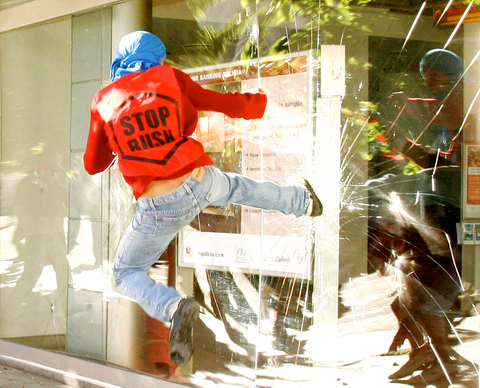US President George W. Bush braced yesterday for the second day of the 34-nation Summit of the Americas here, buffeted by anti-US protests and dogged resistance to his bid for pan-American free trade.
Riot police fired tear gas on Friday as demonstrators threw Molotov cocktails, lit bonfires and smashed shop windows some 600m from the plush hotel where leaders were meeting in the Atlantic resort city of Mar del Plata.
Hundreds of protesters in ski-masks confronted police after a larger group of some 40,000 rallied peacefully at a football stadium to voice their anger at Bush's foreign and economic policies.

PHOTO: AP
The US leader, faced with record low popularity at home as well as abroad, acknowledged the tensions after meeting with Argentine President Nestor Kirchner.
"It's not easy to host all these countries. It's particularly not easy to host, perhaps, me," allowed Bush, whose motorcade whisked past the protests.
Federal police said 64 people were arrested in the clashes, in which a bank and nearby shops were torched. By late on Friday, street violence had subsided and a security source said the situation was "under control."
However, this was not before about 30 attackers tore up sidewalks and hurled the concrete through the windows of the BankBoston branch.
A branch of British-based HSBC also was targeted and an office of local Banco Galicia was set ablaze under a barrage of Molotov cocktails. McDonald's and Burger King restaurants also had their windows smashed.
In protests elsewhere in Argentina, police in the southern city of Neuquen fired tear gas and rubber bullets to disperse demonstrators who threw eggs and stones at a Blockbuster video store, part of a US-owned chain.
In Buenos Aires, protesters covered the Obelisk, the capital's central monument, with a banner declaring "Bush Get Out." Demonstrators burned a US flag nearby.
Canadian Prime Minister Paul Martin said he was "dismayed and deeply troubled by the violence ... We in Canada believe in the free and frank exchange of ideas; peaceful demonstration is a part of this. We cannot allow the integrity of the peaceful exchange of ideas to be demeaned by the deplorable and reckless acts of a few."
Market reforms and a proposed free-trade area of the Americas (FTAA) touted by Bush have encountered growing skepticism amid persistent unemployment and poverty across the Americas.
President Hugo Chavez of Venezuela, a virulent critic of Bush and close ally of Cuba's Fidel Castro, repeated his accusation that Washington was plotting to invade his oil-rich country.
"An imperialist invasion of Venezuela will be the start of a 100-year war," Chavez told the crowd, speaking for more than two hours under driving rain.
Among anti-US activists here were Nobel Peace Prize laureate Adolfo Perez Esquivel; the populist frontrunner in Bolivia's presidential race, Evo Morales; and Argentine football idol Diego Maradona.
On arrival, Chavez, who has boosted his international profile in the region with his coffers flush with petrodollars, announced: "the FTAA is dead and we are going to bury it here."
Officials struggled to agree on the wording of the final declaration to be adopted later yesterday.
also see story:
Leave dissenters out of trade pact: Fox

CHAOS: Iranians took to the streets playing celebratory music after reports of Khamenei’s death on Saturday, while mourners also gathered in Tehran yesterday Iranian Supreme Leader Ayatollah Ali Khamenei was killed in a major attack on Iran launched by Israel and the US, throwing the future of the Islamic republic into doubt and raising the risk of regional instability. Iranian state television and the state-run IRNA news agency announced the 86-year-old’s death early yesterday. US President Donald Trump said it gave Iranians their “greatest chance” to “take back” their country. The announcements came after a joint US and Israeli aerial bombardment that targeted Iranian military and governmental sites. Trump said the “heavy and pinpoint bombing” would continue through the week or as long

TRUST: The KMT said it respected the US’ timing and considerations, and hoped it would continue to honor its commitments to helping Taiwan bolster its defenses and deterrence US President Donald Trump is delaying a multibillion-dollar arms sale to Taiwan to ensure his visit to Beijing is successful, a New York Times report said. The weapons sales package has stalled in the US Department of State, the report said, citing US officials it did not identify. The White House has told agencies not to push forward ahead of Trump’s meeting with Chinese President Xi Jinping (習近平), it said. The two last month held a phone call to discuss trade and geopolitical flashpoints ahead of the summit. Xi raised the Taiwan issue and urged the US to handle arms sales to

State-run CPC Corp, Taiwan (CPC, 台灣中油) yesterday said that it had confirmed on Saturday night with its liquefied natural gas (LNG) and crude oil suppliers that shipments are proceeding as scheduled and that domestic supplies remain unaffected. The CPC yesterday announced the gasoline and diesel prices will rise by NT$0.2 and NT$0.4 per liter, respectively, starting Monday, citing Middle East tensions and blizzards in the eastern United States. CPC also iterated it has been reducing the proportion of crude oil imports from the Middle East and diversifying its supply sources in the past few years in response to geopolitical risks, expanding

Pro-democracy media tycoon Jimmy Lai’s (黎智英) fraud conviction and prison sentence were yesterday overturned by a Hong Kong court, in a surprise legal decision that comes soon after Lai was jailed for 20 years on a separate national security charge. Judges Jeremy Poon (潘兆初), Anthea Pang (彭寶琴) and Derek Pang (彭偉昌) said in the judgement that they allowed the appeal from Lai, and another defendant in the case, to proceed, as a lower court judge had “erred.” “The Court of Appeal gave them leave to appeal against their conviction, allowed their appeals, quashed the convictions and set aside the sentences,” the judges